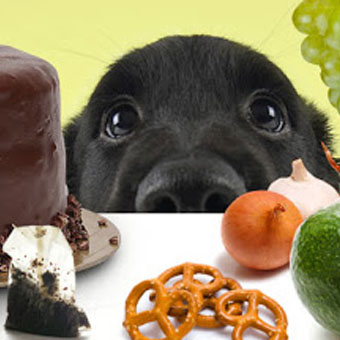March 17th through 23rd is Pet Poison Prevention Week, and an important time to look out for your pet’s safety. As a veterinarian I see all types of pet toxicities, but it is through my own foolish Labrador’s “toxic adventures” that I’ve experienced the anxiety and worry of a pet toxicity. My male Labrador, Magnum, has eaten a full bottle of of urinary continence medication, and another time suffered from the worst case of chocolate toxicity I’ve ever seen.
Magnum loves to eat anything and everything. He doesn’t discriminate with his ingestions, and has savored every type of animal excrement, ingested deceased rodents, gobbled on loaves of bread, destroyed jars of nuts, and slurped up rocks like Beggin-strips. Learn from my experience, on both sides of the exam table and heed Dr. Debbie’s “must know” tips to avoid pet poisonings.
Don’t underestimate motivation
Pets are naturally curious and will knock items off counters, sniff out edibles and unearth household belongings all in the name of something interesting or tasty. Keep counters clear of food and medications. Eliminate opportunities for your pet to get into trouble in the first place.
And if you are the proud owner of a Labrador, as I am, you should know that the Labrador is the most common breed for toxicities. Labradors are very food motivated and poses a keen sense of smell- main reasons why this breed leads in emergency room visits.
Secure human medications

Magnum looking innocent
According to the ASPCA Animal Poison Control Center, the top toxicity in 2012 was from ingested human prescriptions. The main three culprits were heart medications (i.e. blood pressure meds), pain medications, and antidepressants. Secure all human medications and avoid taking your medications with pets in the immediate area. Just one dropped pill can mean big problems for your cat or dog.
Know dangerous human foods
Become informed on common human foods that are off-limits for your pets. A stick or two of sugar-free xylitol containing gum can kill your dog. Grapes, raisins, macadamia nuts, onions, and chocolate are all toxic to animals.
Be aware of chewables
Chewable and flavored pet medications definitely make it simpler to administer our pet’s medications, but are easily ingested in large quantities. Secure all human and pet chewable medications. Common pet chewable medications include arthritis medications, vitamins, supplements, and heartworm preventatives.
Take the evidence
If your pet should suffer a toxic exposure, bring all suspect material. Your veterinarian needs to know what was ingested and the approximate time of ingestion. Don’t make your veterinarian guess on these important details. Look for evidence of vomiting or diarrhea in the home. Bring any chewed medications, containers or vomitus.
Keep emergency numbers handy
Know your veterinarians daytime and after-hours emergency facility phone numbers. Not sure if you need to see the vet? Check out the ASPCA Animal Poison Control Center, a consultation service staffed by veterinary toxicologists to investigate your pet’s toxic risk. Call 1-888-426-4435 or visit http://www.aspca.org/pet-care/poison-control/, consult fees apply.
| Magnum looking innocent |
Fortunately after decontamination, ICU time, and emergency care, silly Magnum came through just fine. But even with a cautious, watchful mom, he still has been able to rack up his share of emergency hospital visits in 11 years.
My best advice to any dog owner, is that no matter how well-behaved the pet or how prepared the owner….your pet is really just one gulp away from a toxicity. Besides, if it can happen to a vet’s pet, it can happen in any pet household.

